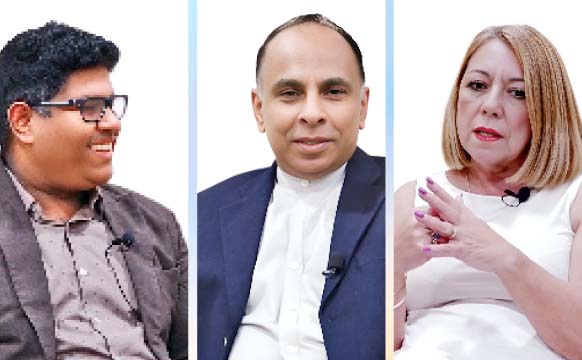Marketing has long been a fundamental function in organisations, bridging the gap between businesses and consumers while shaping brand narratives.
Over the years, as the business landscape has been transformed by sustainability, technological advancements, and shifting consumer expectations, marketing has also evolved. In this fast-changing world, what does it truly mean to be a marketer today?
To explore this question, Global CEO Magazine presents an exclusive discussion with two distinguished professionals who have dedicated their careers to advancing marketing—both as a profession and as an academic discipline—globally and in Sri Lanka.
I’m Tharidu Amarasekara, Senior Lecturer at Postgraduate Institute of Management ( PIM), and joining me for this insightful conversation are two esteemed guests: Ms Maggie Jones, Director of Qualifications and Partnerships at the Chartered Institute of Marketing (CIM), UK, and Dr Asanga Ranasinghe, Director of the Postgraduate Institute of Management (PIM). It’s an absolute pleasure to welcome you both.
To begin, Maggie, having observed the evolution of marketers over time, how do you see the role of marketers changing in today’s complex and dynamic business environment?
Marketing has always been a key driver of business performance. However, in today’s world, marketers must navigate an environment where communication tools are more diverse, data is more abundant, and consumers are more informed than ever before. Additionally, competition is fiercer, making agility a crucial capability for marketers.
The ability to adapt, analyse data strategically, and respond quickly to market shifts is essential. Artificial Intelligence (AI) is also transforming the field, demanding that marketers integrate technology while maintaining a human touch. Marketers must now be more than just communicators—they need to be strategists, data analysts, and innovators.
Essential Skills for Modern Marketers
Dr Ranasinghe, you have been instrumental in shaping marketing professionals for decades. What are the key skills that today’s marketers need—not just to survive but to thrive in this fast-evolving landscape?
The business world is changing at an unprecedented pace, and with it, marketing has shifted from being a function within organisations to a broader philosophy—one that extends beyond the marketplace to the workplace, communities, and the sustainability agenda.
To succeed today, marketers must create and capture value within their organisations. The days of operating in silos with isolated marketing activities are over. Marketers must embrace a global mindset, recognising that consumer behaviour is no longer confined to geographical boundaries.
In addition, marketers must possess strong financial acumen. Understanding Return On Investment (ROI) is critical because marketing decisions must be data-driven and accountable. Businesses no longer operate on gut feeling alone—data analytics, market intelligence, and AI-driven insights are now integral to decision-making.
The Impact of AI on Marketing
One of the most transformative forces in marketing today is AI. Maggie, how do you see AI reshaping the marketing landscape?
There’s significant discussion—and some concern—about AI potentially replacing human roles in marketing. However, I believe AI should be viewed as an enabler rather than a threat. We are currently experiencing an “AI revolution,” much like the industrial revolution of the past.
AI can enhance efficiency, streamline processes, and provide deeper consumer insights.
However, human marketers remain irreplaceable when it comes to critical thinking, creativity, and strategic decision-making. The rise of AI tools, such as DeepSeek, is changing the competitive landscape, even challenging established players like Google. Marketers who proactively integrate AI into their work will gain a competitive edge.
Overcoming Challenges in Upskilling Marketers
Dr Ranasinghe, given the need for marketers to continuously upskill, what challenges do they face in acquiring new competencies, and how does CIM provide solutions to these challenges?
In today’s business world, there is no marketing without data. Big data, analytics, and evidence-based decision-making have replaced intuition-driven marketing. While gut feeling still has its place, it must be supported by data-driven insights.
At PIM, we recognise the importance of upskilling marketers to meet these demands. That’s why we are proud to collaborate with CIM, the world’s leading professional body for marketing. This partnership allows Sri Lankan marketers to pursue both an MBA from PIM and a CIM professional qualification simultaneously. This dual pathway equips professionals with both strategic knowledge and practical marketing competencies.
The Value of the PIM-CIM Collaboration
Maggie, how do you see this collaboration benefiting PIM’s learning partners, and how does CIM engage with universities and business schools globally?
The collaboration between CIM and PIM is more than just an academic partnership—it’s a powerful alliance that will elevate the standard of marketing education in Sri Lanka. By combining the strengths of both institutions, we offer students a unique value proposition that sets them apart in the job market.
Beyond individual benefits, this partnership also strengthens the marketing profession at large. CIM works with over 80 universities worldwide, enhancing its reach and credibility in different markets. Our collaboration with PIM will further deepen CIM’s presence in Sri Lanka while providing Sri Lankan marketers with globally recognised credentials.
Conclusion
We extend our gratitude to Dr Asanga Ranasinghe and Ms Maggie Jones for sharing their insights on the evolving role of marketers, the essential skills required for success, and the transformative impact of AI. Their perspectives on the PIM-CIM collaboration highlight the immense value this partnership brings to marketing professionals in Sri Lanka.


